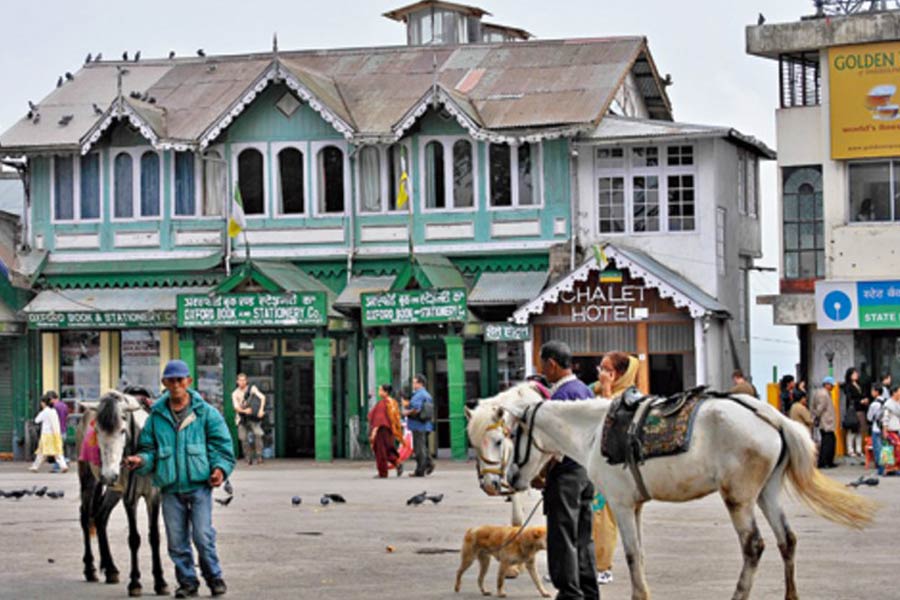Amid a new political alignment in Darjeeling, the demand for a separate state of Gorkhaland is back in focus and electoral fortune of parties hinges on promises of a permanent political solution to the long-pending issue.
Although a separate Gorkhaland state resonated as a major issue in all elections till 2014, it took a backseat in the 2019 polls. Parties, including the indigenous GJM and GNLF, then emphasised on development and restoration of democracy in the region.
Politics in the hills has seen many changes in the last six years.
The GJM, once a dominant force in the area, has become a significantly weakened political entity.
The queen of hills witnessed the entry of two new political parties – the Hamro Party led by Ajoy Edwards, which won the Darjeeling Municipal polls in 2022, and Anit Thapa’s Bharatiya Gorkha Prajatantrik Morcha (BGPM), which swept the Gorkhaland Territorial Administration (GTA) elections in June 2022.
They shifted the focus to provide basic amenities and livelihoods. However, with the Lok Sabha polls approaching, the issue of a permanent political solution (PPS) has again gained momentum in the hills.
The BJP promises a permanent political solution within the next five years, and the Bimal Gurung-led Gorkha Janmukti Morcha (GJM), which switched alliances from the TMC, issued a 'final ultimatum' to the saffron camp, demanding a resolution to the hill problem as a pre-condition for their support in the elections.
BJP MP Raju Bista, who is seeking reelection from the Darjeeling Lok Sabha seat, stated that the “process of finding a permanent political solution for the Darjeeling hills has begun and will be achieved within the next five years”.
"It is our commitment to find a permanent political solution to the issues of the Darjeeling Hills. We stated this in our 2019 manifesto, and talks with the Union Home Ministry have already begun. A solution for the hills, Terai, and Dooars will be achieved within the next five years," Bista told PTI.
Bista mentioned that the “solution would be within the ambit of the Constitution” but did not specify if it meant a separate state.
The BJP has been winning the seat since 2009 with the GJM's support.
GJM general secretary Roshan Giri asserted that if the BJP fails to deliver on the promise of a permanent political solution, they won't support them in the next term.
"For us, a permanent political solution is synonymous with Gorkhaland, a separate state for the Gorkhas. We are hopeful that the BJP will keep its promise," he told PTI.
In 2019, Bista won the seat by a margin of over four lakh votes, securing nearly 59 per cent of the total votes polled. The BJP nominee then rode on public anger against the TMC government's alleged atrocities during the 104-day-long statehood agitation in 2017.
One of Bista's challengers is BJP MLA from Kurseong, Bishnu Prasad Sharma, who is contesting as an independent, pressing for the statehood demand.
He feels that mainstream political parties have failed to understand the aspirations of the hill people.
The Darjeeling hills, renowned for its tea, tourism and timber industry, have experienced bouts of violence since the 1980s due to the demand for a separate state of 'Gorkhaland'. The most recent agitation occurred in 2017, lasting 104 days and leaving a trail of destruction.
The statehood demand and the implementation of the sixth schedule of the Constitution were major issues in the hills in several elections, stemming from the onset of the protracted Gorkhaland movement in 1986.
Congress-Left Front-Hamro Party alliance candidate and Bharatiya Gorkha Parisangh president Munish Tamang, an advocate of Gorkhaland, accused the BJP of betraying the people of the hills.
"Unlike the BJP, which has failed to define what their promise of a permanent political solution means, we advocate a political solution within the Constitutional framework, involving all stakeholders," Tamang told PTI.
Apart from the Gorkhas, other communities residing in the region include Lepchas, Sherpas, and Bhutias.
The TMC, in alliance with BGPM, has fielded former bureaucrat Gopal Lama from the seat, hoping to break the streak of not winning the seat since the party's inception in 1998.
"We are confident of winning the seat based on the developmental work undertaken by the TMC-led state government and the BGPM-led GTA in the hills. For us, the development of the hills is the main poll plank. The BJP won the seat thrice but failed to deliver on their promises," he said.
Although the demand for separation from West Bengal is over a century old, the Gorkhaland statehood movement was ignited by GNLF leader Subhash Ghisingh in 1986.
The violent agitation claimed hundreds of lives, culminating in 1988 with the formation of the Darjeeling Gorkha Hill Council, which governed the region with a degree of autonomy until 2011.
In 2011, after the TMC came to power after defeating the Left Front, the Gorkhaland Territorial Administration (GTA) was established with Gurung as its chief following a tripartite agreement between the state, the Centre, and the GJM.
However, peace was short-lived as Gurung led agitations for statehood in 2013 and orchestrated a 104-day-long strike in 2017, accusing the TMC government of attempting to "wipe out" the Gorkha identity.
Polling for the Darjeeling Lok Sabha seat will take place on April 26.
Except for the headline, this story has not been edited by The Telegraph Online staff and has been published from a syndicated feed.










